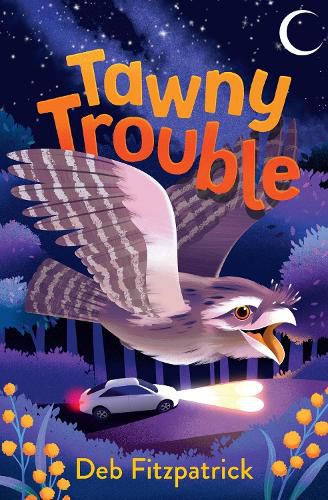Tawny trouble by Deb Fitzpatrick

Tessa is excited to be going on holiday with her Mum, Uncle Mo, little brother Felix and the twins Kivi and Tess. They are going to the Nannup Music Festival, staying in a cottage, part of an old timber cutter’s village nearby, in a karri forest with lots of wildlife. The festival is great with lots of new experiences while the drive back to the cottage in the dark is a bit scary, especially after Uncle Mo tells them the Tasmanian Tiger didn’t just live in Tasmania but could have been in this area too. After narrowly avoiding a big kangaroo on the road everyone is on the lookout for wildlife, especially the Nannup Tiger. Then, on the second night they do hit something, a strange looking bird with big eyes. Tessa helps wrap the injured bird in some old towels and they take it back to the cottage. In the morning they find that there is a registered wildlife carer nearby and they take the bird, a tawny frogmouth, to Otto, a bit of a local character living off grid and caring for lots of injured wildlife. They leave the bird with Otto but Tess is conflicted, she has bonded with the bird and is worried about it being cooped up in an aviary. What should she do?
This simple story about a family rescuing an injured bird has a lot to offer, a lovely location with issues such as conservation and the importance of wild places to learn about Australian wildlife. There are incidental learning opportunities like not feeding wildlife inappropriate food, rules for handing over injured wildlife to a vet or registered carer within 72 hours and why light pollution interferes with viewing the night sky. Everyone can relate to the children’s reluctance to use the outside toilet at night but sharing it with a possum changes Tessa’s mind, even if she does scurry inside after and bolt the door against the tiger. Fremantle Press has an activity sheet for classroom use. Readers of Deb Fitzpatrick's Kelpie Chaos will enjoy this warm animal tale.
Themes: Australian wildlife, Wildlife rescue, Conservation, Family.
Sue Speck